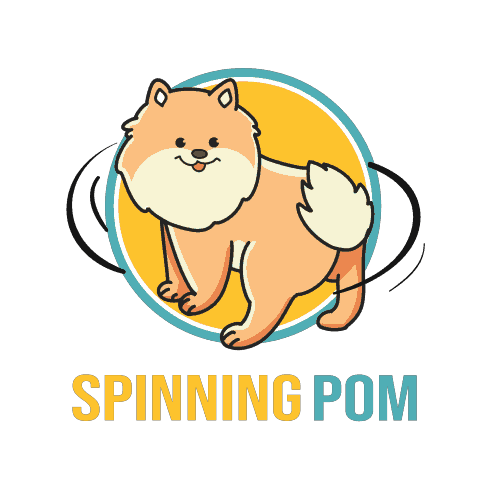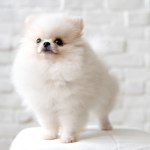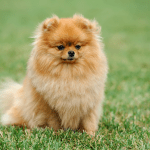In the category of health risks to which small Pomeranians are prone, food allergies are the third most common and make up approximately 10% of all the allergies that give dogs digestive, respiratory, and skin problems. Pomeranian food allergies can come from a wide range of foods including beef, grain, soy, dairy products, eggs, chicken, lamb, and much more.
For caring and responsible Pomeranian owners, it is absolutely essential that they keep a close watch on their beloved puppy and check for the common signs of Pomeranian food allergies such as scratching, diarrhea, stomach upset, coughing, runny nose, and more.
By carefully monitoring their diet and then eliminating foods depending on whether allergic symptoms occur, your Pomeranian can be cured and healthy in no time. In this article, I’ve put together information on some of the most common types of small Pomeranian food allergies.
General Grains
While wheat and soy are some of the most common of these and will be covered further, Pomeranians and other dogs are often sensitive to different grain products. Unfortunately, some of the inexpensive foods use a lot of grain as filler and some even list grain as their primary ingredient. This is a great reason to only buy healthy, high-quality dog food for your Pomeranian. Even if your Pomeranian isn’t allergic to corn, some cheap dog food or treats have corn as the first ingredient.
This is probably because they are relying on the sweet sugary corn to make the product addictive for Pomeranians and add calories without higher quality and more expensive ingredients. Some Pomeranians are highly allergic to corn and others may show minor sensitivities to it.
If your Pomeranian isn’t allergic to corn it may not be a problem in small quantities, but in excess it can make your Pomeranian overweight and even cause diabetes. Other grains that can cause Pomeranian food allergies include oats, barley, and millet as well as the soy and wheat we’ll discuss next.
Wheat
Carbohydrate-containing foods such as wheat or wheat gluten have also been identified as allergens. This could be due to a genetic disposition in the Pomeranian which causes rashes and itching upon wheat consumption. If you suspect that your Pomeranian is having an allergic reaction to grain, the best option would be to consult a veterinarian since every breed may have a different reaction to the types.
Soy
In some cases, consuming soy has also been identified as causing Pomeranian food allergies. Despite the many benefits of the ingredient, doctors have said that its harmful effects outweigh the positives. Some of the possible negative side effects include liver disease, kidney infection, thyroid problems, and more. Better to be on the safe side and keep a lookout for soy-based products which may be causing the allergic reactions in your Pomeranian.
Beef
Many people are surprised at how many Pomeranians are allergic to beef. The reason behind the fact is simple: allergies in Pomeranians are caused by repetitively feeding them the same food for a prolonged period of time.
Many Pomeranian owners may as well be feeding their beloved Pomeranian beef (and not varying their diet) and as a result year’s later allergic symptoms arise. Proteins are very common allergens and beef is an even more common component in a lot of pet foods; eliminating beef is a wise option if you have just begun to monitor your Pomeranian’s diet for allergy foods.
Eggs
Next, we have eggs. As surprising as it may seem, the proteins present in egg yolk can also be the cause behind the allergic rashes appearing on your Pomeranian’s body. Your Pomeranian’s immune system may be identifying these proteins as harmful and thus causing the itching reactions. Eggs can be avoided in the diet by checking the labels on the back of Pomeranian foods; be sure to see that eggs have not been included on the ingredient list.
Dairy Products
The lactose present in dairy products like milk and yogurt is a common cause of two types of Pomeranian food allergies, namely lactose allergy and lactose intolerance. As a Pomeranian owner, you must take care to distinguish between the two; lactose intolerance is characterized by indigestion, vomiting, gas, and diarrhea.
Lactose intolerance does not cause skin problems or itching which happens due to a lactose allergy. Diagnosing dairy products as a cause is a tricky business since it is important to distinguish between the two types.
Lamb
Chicken and beef are the most commonly used ingredient in Pomeranian foods. However, when cases of allergic reactions started showing up, companies began to look for a substitute in order to satisfy their growing client base.
Lamb was considered a healthier substitute until its consumption also started to show the signs of irritation and skin problems in Pomeranians. Instead of lamb, a better option to avoid Pomeranian food allergies could be to feed your Pom venison as an allergen-free substitute.
Pork
It is safe to say that protein-based foods such as pork, chicken, beef, and lamb all have the potential to cause some type of allergic reaction. Proteins are the most common types of nutrients which are wrongly identified as harmful, resulting in the reaction. Pork is not an exception with respect to causing Pomeranian food allergies.
Final Thoughts
Aside from the foods listed above, there may very well be others which are causing problems for your Pomeranian. As advised above, it is wise to adopt the process of elimination in order to identify the allergy-causing food. In the case that the symptoms continue to persist, the allergic reaction may then have been caused by another factor such as a dye, or environmental issues like pollen or dust.
Also, you definitely only want to purchase healthy, high-quality dog food for your Pomeranian. A little effort in getting the right dog food can go a long way for the overall health and happiness of your Pomeranian.
Food allergies are primarily caused when antibodies in the body mistake protein from food molecules as harmful particles and attempt to get rid of them, thus causing the rashes and itching. However, as dangerous as Pomeranian food allergies may seem, through careful observation and a lot of love they can be easily identified and your lovely Pomeranian cured in no time.





